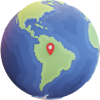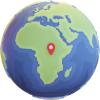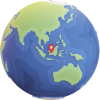Case studies are organised by region, with each region featuring links to the countries where the case studies are located.
Democratic Republic of the Congo

The United States (US) sanctioned international mining magnate Dan Gertler for amassing a billion-dollar fortune through opaque and corrupt mining deals in the Democratic Republic of the Congo (DRC). In 2017, Gertler was sanctioned for allegedly using his close friendship with then President Joseph Kabila to act as an intermediary for mining asset sales in the DRC, which created a system where multinational companies had to go through Gertler to do business with the Congolese state. According to the US, the DRC reportedly lost over $1 billion in just two years due to Gertler’s corrupt deals. Despite being sanctioned by the US, Gertler was able to continue operating in the DRC’s mining sector through an international money laundering network that spanned from the DRC to Europe and Israel. In one instance, Gertler acquired new mining permits through proxy companies in the lead up to the 2018 Congelese elections. Moreover, as of 2022, Gertler was still reportedly earning millions of dollars from copper-cobalt mining interests in the DRC despite US sanctions.
Keywords: Sub-Saharan Africa, Democratic Republic of the Congo, minerals, cobalt, copper, corruption and bribery, sanctions evasion, money laundering
Source: https://home.treasury.gov/news/press-releases/sm0243

The Democratic Republic of Congo (DRC), a leading cobalt supplier, is grappling with environmental and human rights issues due to industrial cobalt mining. A report by RAID and AFREWATCH reveals that toxic pollution from cobalt mining in and around Kolwezi, the heart of DRC’s cobalt industry, is devastating the lives of hundreds of thousands of Congolese people. The report challenges the narrative of ‘clean’ and ‘sustainable cobalt’ promoted by multinational mining companies. It highlights the impacts of water pollution, including health issues among local residents and destructive consequences on local ecosystems and agriculture. The report underscores the urgent need for sustainable practices and effective regulations to protect the DRC’s communities and environment and calls for companies buying cobalt to ensure responsible sourcing.
Keywords: Sub-Saharan Africa, Democratic Republic of Congo (DRC), minerals, cobalt, primary production, human rights violations
Source: New report exposes the environmental and human costs of DRC’s cobalt boom - RAID (raid-uk.org)

In 2021, the Democratic Republic of Congo’s (DRC) Tshopo province lost 12,000 hectares of intact forests to fires, a record-breaking loss linked to the expanding cultivation of cacao by recent migrants from neighbouring North Kivu province. This influx of people is caused by mass displacement of people from the South and North Kivu provinces in 2019 and 2020, which is, as a result, fuelling greater demand for food crops and an increase in cash crop production, especially cacao.
Some newcomers are financially well-off and able to purchase land from local chiefs to establish plantations, replacing forested areas. This has sparked tensions within local communities as land is considered communal property in many parts of Tshopo.
Cacao production, a well-documented driver of deforestation in West Africa, is now impacting the DRC. Efforts are being made to improve cultivators’ incomes to tackle child labour and prevent further deforestation. However, the specific dynamics in the DRC present unique challenges that need to be addressed.
Keywords: Sub-Saharan Africa, The Democratic Republic of Congo (DRC), cocoa, child labour, land grabbing, deforestation
Source: https://news.mongabay.com/2022/02/drcs-cacao-boom-leaves-a-bitter-aftertaste-for-congo-basin-forest/#:~:text=DRC's%20cacao%20boom%20leaves%20a%20bitter%20aftertaste%20for%20Congo%20Basin%20forest,-by%20Malavika%20Vyawahare&text=The%20DRC's%20Tshopo%20province%20lost,DRC%20move%20into%20the%20province


A report by Congo in Conversation explains how the production of the charcoal, or "makala", in Congo's North Kivu Province, contributes to an illegal trade. This trade has a significant environmental impact on Virunga National Park. The national park, a UNESCO World Heritage site, suffers from deforestation as a consequence of these activities, since over half the charcoal consumed in nearby Goma is illegally sourced from the park. In addition, the charcoal trade supports criminal networks and contributes to ongoing violence, including clashes between park rangers and armed groups, leading to numerous fatalities. Generating around $35 million annually, the charcoal trade is controlled by armed groups like the Democratic Forces for the Liberation of Rwanda (FDLR), which only exacerbates environmental destruction and local conflicts. The FDLR exploits natural resources, including charcoal, to fund its activities, imposing taxes on loggers and charcoal burners. Despite government acknowledgment of the issue, little action has been taken due to corruption and complicity among officials.
Keywords: Sub-Saharan Africa, The Democratic Republic of Congo, charcoal, primary production, trade and transport, terrorist and conflict financing, organised crime, deforestation
Sources: https://congoinconversation.fondationcarmignac.com/en/reportages/congo-s-charcoal-an-illegal-trade-a-precarious-lifeline-guerchom-ndebo

A Global Witness investigation in 2019 found that ten European companies had sourced over $2.26 million of wood from a company engaged in illegal logging in the Democratic Republic of the Congo (DRC). Illegal logging in the DRC is one of the main deforestation threats in the country, which has the world’s second largest tropical rainforest. In one case, Global Witness accused IFCDO, a timber trading company, of harvesting timber outside of its approved annual harvest area. The same company also allegedly failed to pay taxes and violated local labour laws. The investigation found that much of the illegally sourced timber was placed on Vietnamese and Chinese markets, which have fewer checks in place to prevent the import of illegal timber.
Keywords: Sub-Saharan AFrica, The Democratic Republic of Congo, timber, primary production, illegal logging, illegal timber trade, tax evasion, labour rights violations
Source: https://www.occrp.org/en/daily/9392-european-companies-connected-to-illegal-drc-timber

The Verité report on coffee in Africa examines the challenges and issues within the coffee supply chain, focusing on labour rights and social responsibility. It highlights widespread issues such as child labour, forced labour, and poor working conditions among coffee workers across several African countries. These problems are exacerbated by factors like poverty, lack of education, and inadequate labour protections. The report identifies key areas for improvement, including enhancing transparency and accountability throughout the supply chain, strengthening labor laws and enforcement mechanisms, and promoting responsible sourcing practices among coffee buyers and exporters.
Verité calls for concerted efforts to address systemic issues in the coffee sector, ensuring that economic growth benefits all stakeholders fairly and sustainably.
Keywords: Sub-Saharan Africa, The Democratic Republic of the Congo, coffee, primary production, labour rights violations, forced labour, child labour
Source: https://verite.org/africa/explore-by-commodity/coffee/


The Environmental Crimes Financial Toolkit is developed by WWF and Themis, with support from the Climate Solutions Partnership (CSP). The CSP is a philanthropic collaboration between HSBC, WRI and WWF, with a global network of local partners, aiming at scaling up innovative nature-based solutions, and supporting the transition of the energy sector to renewables in Asia, by combining our resources, knowledge, and insight.


